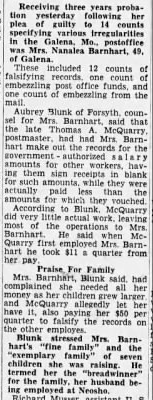Historical Notes: Second Interlude
Notes from the Desk of a Real Scatterbrain
Original content from the desk of Otis Bulfinch
As I continue to dig through the archives, sorting through boxes of moldering newspapers and faded correspondence, I find myself confronted with the peculiar challenge of reconstructing a life lived largely in the realm of fiction. T. Allen McQuary—or "Mack" as he came to be known—seems to have left behind a paper trail as convoluted and contradictory as the man himself.
What strikes me most forcefully is not what McQuary accomplished, but what he attempted to accomplish. Here was a man who understood, perhaps better than his contemporaries, that the line between journalism and entertainment had already begun to blur in his era. The rise of yellow journalism that we explored in our previous chapters wasn't just a backdrop to McQuary's story—it was the very air he breathed, the medium in which his particular talents could flourish.
Recently, I discovered a cache of materials that McQuary himself apparently prepared for his various speaking engagements. These promotional materials, carefully preserved in what appears to be his own handwriting, reveal a man acutely conscious of his public persona. Consider this fragment from what seems to be a template for introducing himself to potential audiences:
"Ladies and Gentlemen, you have before you tonight a man who has traveled further than Marco Polo, endured hardships that would have broken lesser men, and witnessed the kind of adventure that most people only dream of. Yet I stand before you not as a boastful conqueror, but as a humble chronicler of the human spirit's capacity to transcend the ordinary..."
The audacity is breathtaking, isn't it? And yet there's something almost admirable about the commitment to the performance. McQuary wasn't just lying—he was crafting a mythology, creating a legend that he himself was determined to inhabit.
The newspaper accounts from this period are particularly revealing. A review in the Charleston Daily Mail from 1898 describes McQuary's lecture as "a thrilling account of modern adventure that held our audience spellbound for over two hours." Yet the same reviewer notes, almost as an aside, that "Mr. McQuary's stories, while entertaining, seem to grow in the telling."
Perhaps that's the key to understanding McQuary: he was a stories that grew in the telling. Each retelling added new details, new flourishes, new impossibilities that somehow made the whole narrative more compelling rather than less believable. He understood something fundamental about human nature—that we want to believe in the impossible, especially when it's told to us by someone who seems to have lived it.
What haunts me as I work through these materials is the trajectory I can already sense taking shape. The young man who left Neosho with such grand ambitions, who captivated audiences from Missouri to the Carolinas to Yokohama, Japan, to Oregon to Kansas and back to Missouri, who seemed to possess an almost supernatural ability to reinvent himself—this same man would end his life under an oak tree behind a small town post office, all but forgotten by the world that had once hung on his every word.
The Interludes, as I've come to think of them, trace this arc from aspiration to dissolution. They carry us from the time of the Quest to July 27, 1948, and the moments leading up to McQuary's final act of self-determination. In between, we find a man gradually discovering that the gap between fiction and reality, once crossed, becomes increasingly difficult to bridge.
But I'm getting ahead of myself. For now, let us return to 1897 and watch as young Mack McQuary prepares to launch himself into the world with nothing but his wits, his imagination, and an unshakeable belief that he was destined for something greater than the constraints of ordinary existence would allow.
The promotional materials continue, and with them, the slow accumulation of a legend that would ultimately consume the man who created it.
The Barnhart Connection
New evidence has emerged regarding Nanalea Barnhart, the woman at the center of McQuary's embezzlement scandal. This article from October 1948 reveals the human cost of McQuary's schemes - a widow with seven children caught up in his financial fraud:

Click image to enlarge and read
Key Points from the Article:
- Nanalea Barnhart, 49, of Galena, Missouri received three years probation after pleading guilty to 14 counts of postal irregularities
- Charges included: 12 counts of falsifying records, one count of embezzling post office funds, and one count of embezzling from the mail
- McQuary's role: According to her lawyer Aubrey Blunk, "MQuarry [sic] did very little actual work, leaving most of the operations to Mrs. Barnhart"
- Family situation: Mrs. Barnhart was described as the "breadwinner" for her "exemplary family" of seven children, with her husband employed in Neosho
- The human cost: A widow and mother of seven caught up in McQuary's schemes, facing criminal charges while trying to support her large family
The Springfield News-Leader
Springfield, Missouri
Tue, Oct 5, 1948 · Page 1